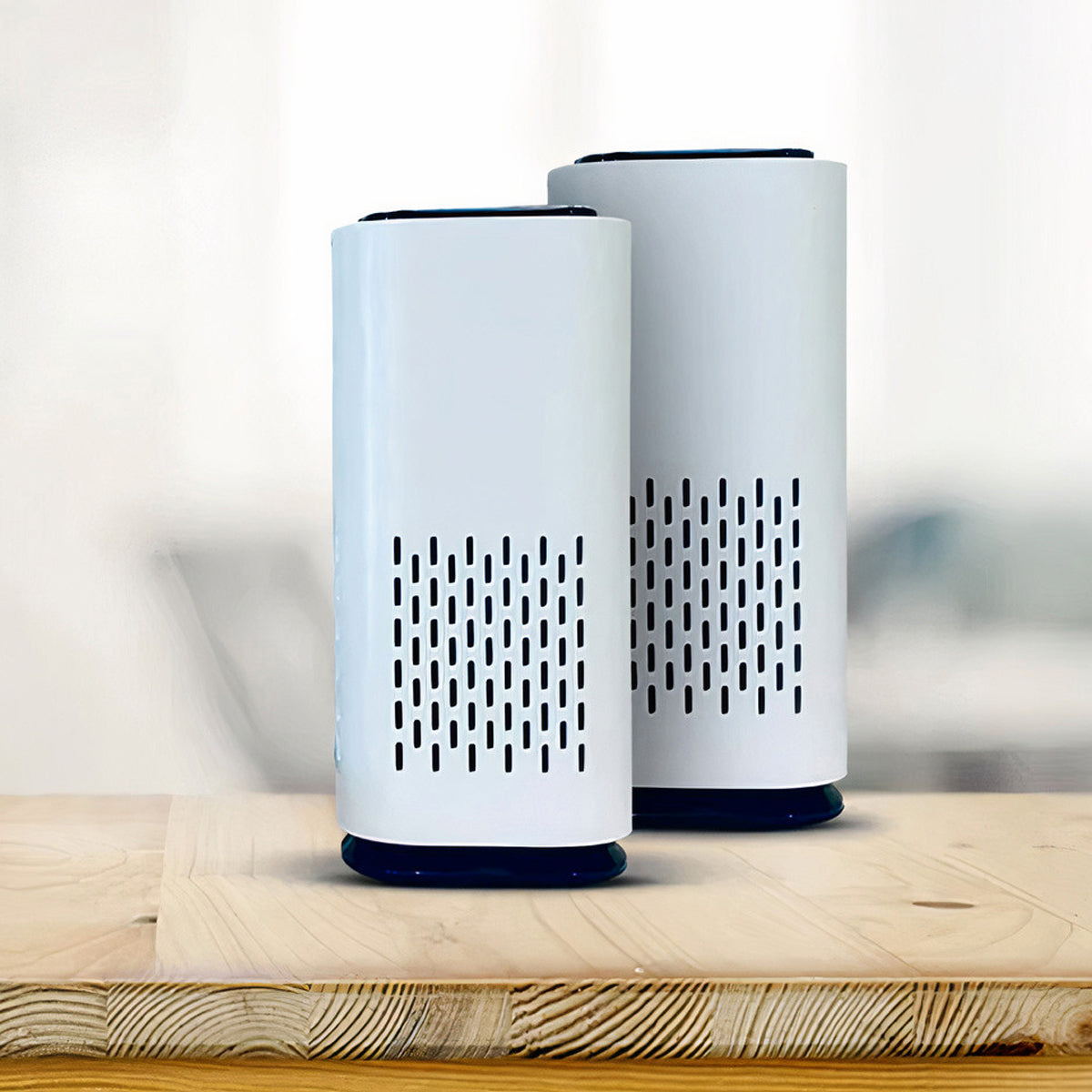Image Credit: National Elf Service
The Effects of Air Quality on Mental Health and Well-being
Poor air quality can have a range of adverse effects on mental health and well-being due to the impact of pollutants on the brain. Several studies suggest that exposure to short-term and long-term air pollution can exacerbate mental health problems like anxiety, depression, and sleep quality.
What the studies say about air quality
Studies examining the impact of poor air quality on mental health have shown various associations between exposure to air pollutants and the increase in mental health conditions. While research is ongoing and the exact mechanisms are not fully understood, several studies indicate that exposure to air pollutants can cause inflammation, neurotransmitter disruption, and cognitive impairment, all of which have been shown to cause increased mental health concerns.
How does air quality impact mental health?
Poor air quality has been linked to several negative mental health concerns. In one particular study, researchers noted an increase in mental health symptoms and behaviors after exposure to higher-than-average levels of air pollution.
Below are several ways that poor air quality can affect your mental health:
Increased stress and anxiety
Exposure to air pollutants, such as fine particulate matter and volatile organic compounds, has been linked to increased stress and anxiety. Pollutants can trigger biological responses in the body that lead to the release of stress hormones, contributing to feelings of unease and restlessness. This hormone imbalance can lead to several adverse mental health conditions.
Increased feelings of depression
New research suggests poor air quality might be associated with an increased risk of depression. Exposure to air pollutants can lead to inflammation in the body, including the brain, which is believed to play a role in developing mood disorders like depression.
Reduced quality of sleep
Poor air quality, especially high indoor air pollutants, can disrupt sleep patterns. This can lead to fatigue, irritability, and difficulty concentrating, all of which can worsen mental health conditions.
Increased symptoms of existing mental health conditions
Individuals with pre-existing mental health conditions, such as bipolar disorder or schizophrenia, may experience exacerbated symptoms when exposed to poor air quality, according to one study. Air pollutants can influence neurotransmitters and potentially disrupt the balance of brain chemistry in vulnerable individuals.
Impaired development in children
Studies show that children exposed to poor air quality during critical stages of development may be at risk of cognitive and behavioral problems that can persist into adulthood. These issues can affect academic performance, self-esteem, and overall mental well-being.
How to improve air quality for better mental health
Improving air quality involves taking steps to reduce the presence of pollutants in the air that we breathe. It’s important to keep indoor spaces well-ventilated by opening windows and using exhaust fans throughout the home and workspace.
Another way to help reduce the impact of air pollutants in the air is to plant trees, shrubs, and other vegetation around your home and in urban areas. Plants help filter the air by absorbing pollutants and, therefore, can improve air quality and increase mental well-being. You can also help improve your neighborhood's mental health by advocating for creating and maintaining parks, green spaces, and urban gardens in your community.
Lastly, install high-quality air purifiers with HEPA filters in your home and consider a portable air purifier, such as the KIKI Pure A2 UV & 3 StageH13 HEPA Air Purifier, to filter out indoor air pollutants on the go. These portable air purifiers can help to reduce pollutants during your travels in your car, hotel rooms, workplaces, and even while camping. Keeping a portable air purifier handy can be an essential companion for you and your family.
Ten ways to help you achieve better mental health
To mitigate the impact of poor air quality on mental health, individuals can focus on staying informed about local air quality conditions, using portable air purifiers while traveling, spending time in well-ventilated areas, adopting lifestyle changes that can positively impact mental health, and implementing healthy lifestyle changes, such as those listed here:
- Regular Exercise: Engaging in regular physical activity, such as walking, jogging, yoga, or swimming, can release endorphins (natural mood lifters) and help reduce symptoms of stress, anxiety, and depression.
- Healthy Diet: A balanced diet rich in whole foods, fruits, vegetables, lean proteins, and healthy fats can provide the necessary nutrients for brain health. Omega-3 fatty acids, found in fish, flaxseeds, and walnuts, have been associated with improved mood.
- Adequate Sleep: Prioritize getting enough quality sleep each night. Sleep plays a crucial role in mood regulation and cognitive function.
- Mindfulness and Meditation: Practicing mindfulness and meditation can help reduce stress, improve focus, and enhance emotional regulation. Techniques like deep breathing and progressive muscle relaxation can also be beneficial.
- Social Connections: Maintaining relationships and engaging in social activities can provide a sense of belonging and support. Positive social interactions can boost mood and alleviate feelings of loneliness.
- Time in Nature: Spending time in nature and getting fresh air can have a calming and rejuvenating effect on mental health. Even a short walk in a natural setting can have positive impacts.
- Creative Outlets: Engaging in creative activities, such as painting, writing, playing a musical instrument, or crafting, can provide an outlet for self-expression and stress relief.
- Limiting Screen Time: Reducing excessive screen time, especially on social media, can help prevent feelings of comparison, anxiety, and information overload.
- Setting Realistic Goals: Breaking down tasks into manageable steps and achieving small goals can boost self-esteem and provide a sense of accomplishment.
- Volunteering and Helping Others: Contributing to your community or helping others can foster a sense of purpose and satisfaction, improving overall well-being.
When to see a mental health practitioner
If you believe you are dealing with mental health concerns caused by air quality, discussing them with a mental health professional is essential. Seeking mental health therapy is vital for promoting overall health and well-being and understanding the root causes of your concerns.
You can help to improve your mental health by implementing small steps into your everyday life and being aware of the air quality around you. While traveling, it can be helpful to bring a portable air purifier, such as the KIKI Pure A2 UV & 3 StageH13 HEPA Air Purifier, to protect yourself and your loved ones. If you believe you have mental health concerns, such as anxiety, depression, or sleep disturbances caused by the air quality you are breathing, it is essential to discuss them with your practitioner.
Improving air quality requires collective efforts at individual, community, and governmental levels. By adopting clean air strategies and advocating for cleaner air practices, we can help improve mental health and well-being and promote a healthier environment for ourselves and future generations.
References:
The Journal of Nature Sustainability. Urbanites’ mental health undermined by air pollution https://www.nature.com/articles/s41893-022-01032-1
PLoS Biology. Environmental pollution is associated with increased risk of psychiatric disorders in the US and Denmark. https://journals.plos.org/plosbiology/article?id=10.1371/journal.pbio.3000353
Journal of NeuroToxicology. Air pollution, depressive and anxiety disorders, and brain effects: A systematic review https://www.sciencedirect.com/science/article/abs/pii/S0161813X22001668?via%3Dihub
American Psychiatric Association. Air Pollution’s Impact on Mental Health. https://www.psychiatry.org/news-room/apa-blogs/air-pollution%E2%80%99s-impact-on-mental-health
The Ochsner Journal. Growing Evidence for the Impact of Air Pollution on Depression. https://www.ncbi.nlm.nih.gov/pmc/articles/PMC6447209/
Nurse Forum. Sleep quality: An evolutionary concept analysis https://pubmed.ncbi.nlm.nih.gov/34610163/
Annual Review of Public Health. Happiness and Health. https://www.annualreviews.org/doi/pdf/10.1146/annurev-publhealth-040218-044150



